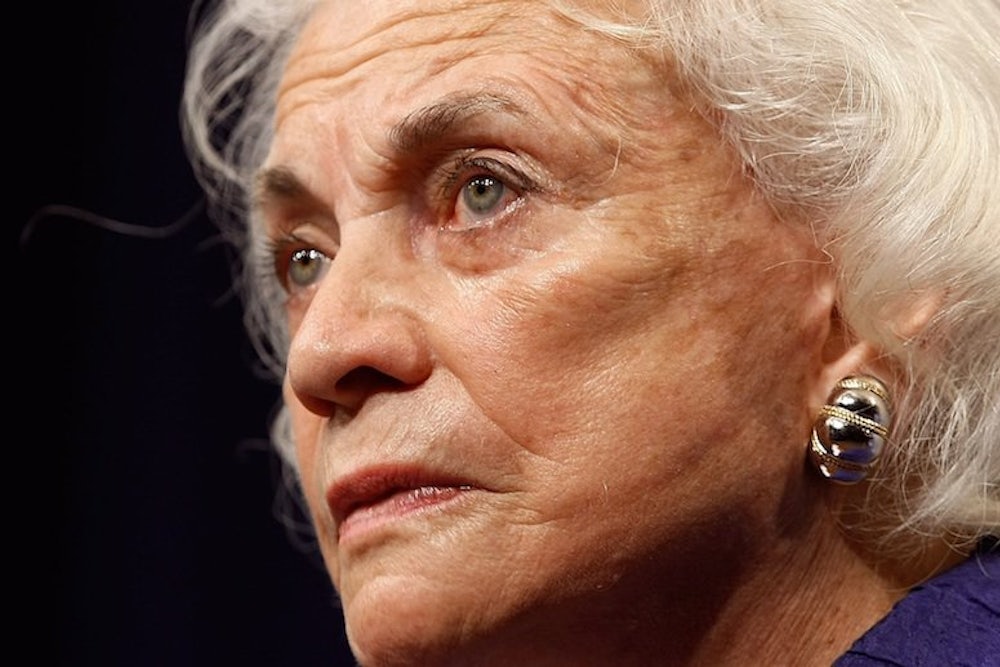Thirteen years, two wars, and an economic disaster later, retired Justice Sandra Day O’Connor told the Chicago Tribune editorial board this week that maybe the Supreme Court had made a mistake in its Bush v. Gore decision, which effectively gave George W. Bush the White House in 2000. O’Connor was, of course, one of the majority votes in that 5-4 decision. Many commentators, thinking about previous votes she had cast for progressive causes, called her vote the “swing vote” in Bush v. Gore and have wondered for years what she could have been thinking. At the time, Newsweek reported that, when Dan Rather originally called Florida for Al Gore, O'Connor told people at an Election Day party in Arizona, "this is terrible"—a statement that seemed inconsistent with her reputation for independence, and which was disputed at the time.
Her main regret, O’Connor now says, is not the damage her fifth vote did to the country, but rather that it "gave the Court a less-than-perfect reputation." The decision led people to perceive it as a political institution, rather than a deliberate, nonpartisan one. "Maybe the Court should have said, 'We're not going to take it, goodbye,'" O'Connor told the Tribune.
But O’Connor herself hasn’t always taken such a sanitary view of the Court: A 1988 letter she wrote to her close Republican friend Barry Goldwater, which I discovered while researching a book on O'Connor and Justice Ruth Bader Ginsburg, presages the partisan view of the Court Newsweek attributed to her in 2000—and makes her new critique of Bush v. Gore harder to credit.
Although most of O’Connor’s papers are private, her legendary secrecy could not prevent the publication of her correspondence with others, including Goldwater, who saved her letters to him. On November 1, 1988, then-sitting Justice O’Connor wrote to Goldwater to bemoan the state of the nation on the eve of the presidential contest between Democrat Michael Dukakis and Republican George H.W. Bush.
"A week until election day," Justice O'Connor wrote. "Despite your advice, the campaign never really hit the basic issues. People are tired of it all. Many will not vote. I will be thankful if George B. wins. It is vital for the Court and the nation that he does.” (emphasis mine.)
As a Reagan appointee, O’Connor’s hope for a Republican victory might be understandable, though by 1988 she had already demonstrated an inclination to vote differently on occasion than her conservative colleagues. Just before O’Connor wrote the letter to Goldwater, Ronald Reagan had added Antonin Scalia to the bench. Scalia had already penned several of his trademark scathing dissents, some of which were directed at O’Connor when she voted on the liberal side. Nonetheless, as she put it, she would be "thankful" if, after the votes were counted in 1988, another Republican would continue to shape the Court. And so he did. One of the first President Bush’s two appointees, Clarence Thomas, sits on the Court to this day.
It’s vieux jeu that the Court follows the election returns, but rarely has party affiliation and the composition of the Supreme Court been so closely linked as they were in Bush v. Gore. Justice O’Connor’s more moderate track record has, typically, exempted her from this criticism—but it’s clear from her letter to Goldwater that, at least at one point, she too saw the Court as a political body.
Linda Hirshman is the author of Victory: The Triumphant Gay Revolution, a New York Times Notable Book of 2012. She is at work on a book about Justices O’Connor, Ginsburg, and the achievement of legal equality for women.
